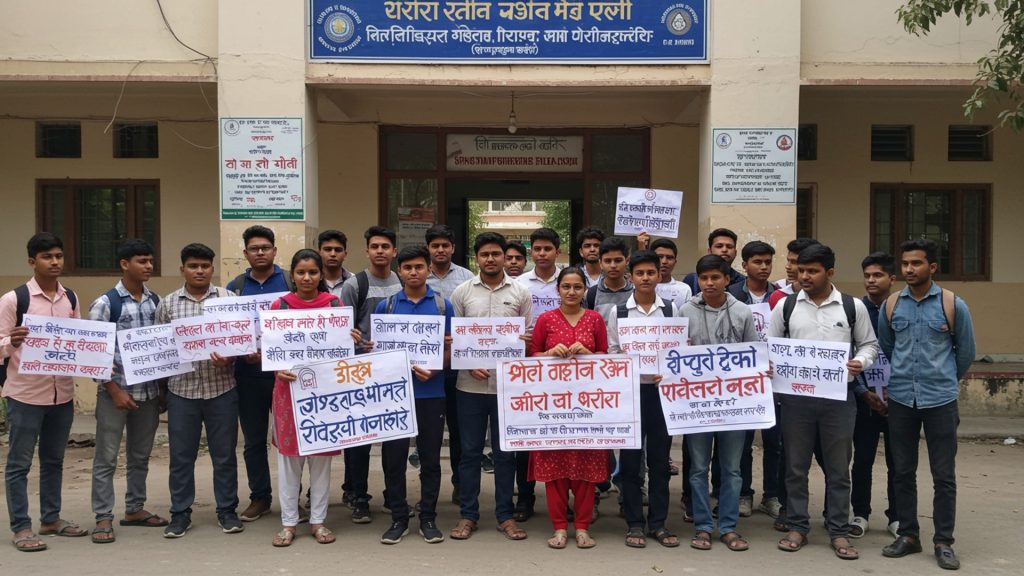The Rajasthan government unexpectedly stops student union elections across the state, a sudden choice that takes away the voice of thousands of students in colleges and universities. This big delay happens today, with officials saying it is because of worries about how the new National Education Policy (NEP) is being put in place. As schools get ready for major changes under the NEP, student leaders are unsure about their place and how the new education system will change campus life. This decision leaves many wondering about the future of student groups and their power to speak out.
Government Informs Court About Delay
The Rajasthan government has told the High Court that student union elections will not be held in universities and colleges this academic year. This decision was shared with the court on Wednesday. The main reason given for this postponement is the ongoing effort to put the National Education Policy (NEP) into effect. The government presented its reply in the High Court in response to a legal case. This case was filed by Jai Rao, a student at Rajasthan University, on July 24. Mr. Rao had argued that students have a basic right to choose their representatives. He also pointed out that student union elections have not been held in the state for the last three academic sessions. The state government’s response to the court explained that current academic conditions make it hard to conduct these elections. Officials mentioned guidelines from the Lyngdoh Committee, which state that student union elections should happen within eight weeks of the start of the academic year. The government said that the academic calendar has changed because of the new education policy, making it difficult to follow this timeline.
Reasons For The Postponement
A key reason given by the government for not holding elections is the smooth rollout of the National Education Policy 2020. This policy is bringing many changes to the education system. University officials have given feedback that holding elections at this time would cause problems. A meeting was held on August 6, where Vice-Chancellors from nine universities were present. This meeting was led by the Additional Chief Secretary for Higher Education. All the Vice-Chancellors at this meeting agreed that elections should not be held this year. They said that elections would disturb classes and create an unstable academic situation. Some Vice-Chancellors even suggested that student union elections should be put off for three to four years, or even stopped completely. They believe this would help in putting the new education policy into practice without problems, as the policy requires a lot of administrative work. The Vice-Chancellors shared several concerns about holding elections:
- Elections could disrupt ongoing academic activities.
- They would make it difficult to follow the guidelines of the National Education Policy.
- Elections affect studies and the semester system, which can then delay exam results.
- Delayed results might prevent students from getting admission in universities in other states.
- The mandatory 90 days of teaching in each semester under the Choice Based Credit System (CBCS) means that elections, which can affect up to two months of the timetable, are hard to fit in.
- Student voter turnout is often very low, sometimes below 25 to 30 percent.
- Admissions for some courses are still happening in certain universities.
Beyond academic reasons, there are also concerns about law and order. The higher education department received details from police and education experts that elections can lead to challenges and possible unrest. They highlighted issues like stone pelting, fights, traffic jams, damage to public and private property. caste tensions during polls.
“Admissions for Undergraduate and Postgraduate courses are complete, with mid-term examination in September and final term examination in November. Student voter turnout is below 25 to 30 per cent. Elections delay university’s results, affecting students’ admissions and competitive exam opportunities in other states. Suggested banning elections for smooth NEP implementation.” – Alpana Kateja, Rajasthan University Vice-Chancellor.
“Academic session is delayed, university examination results are pending, NEP 2020 implementation is underway.” – Tribhuvan Sharma (Acting), Maharaja Surajmal Brij University, Bharatpur.
Reactions From Student Bodies
The government’s decision to postpone student union elections has led to strong reactions from student organizations across the state. They have voiced their disagreement and are demanding that the elections be held soon. The Akhil Bharatiya Vidyarthi Parishad (ABVP), a student group, has called this move “wrong” and asked the government to set up a committee to look into the matter again. The National Students’ Union of India (NSUI), another student group, has strongly criticized the current government. Its state president, Vinod Jakhar, said that the government is “strangling democracy” and taking away the democratic rights of students. The NSUI has said it will fight this decision both in the streets and in the assembly. The NSUI has also held big protests in Jaipur to press for student union polls. The Students’ Federation of India (SFI) stated that postponing elections by using the new education policy and Lyngdoh Committee rules as an excuse is “undemocratic and anti-student”. The SFI believes that student union elections are vital for making universities more democratic and for making students aware of their rights and duties. The SFI has warned that if the government does not listen to their demands, they will start a large-scale movement. Student leaders have already held several protests in recent weeks to demand that elections happen without further delay. Some student leaders protesting at Rajasthan University were even held by the police.
Past Decisions And Political Views
This is not the first time student union elections have been postponed in Rajasthan. In 2023, the previous government, led by Ashok Gehlot, also put off these elections. At that time, reasons given included preparations for the assembly elections and the start of various parts of the new education policy. There were also concerns about the use of money and power in student elections. After the new government came to power in December 2023, the student union elections were still not held in 2024. Former Chief Minister Ashok Gehlot has criticized the current government’s decision. He said that the ruling party does not want young people to be aware of politics. He also questioned why the ABVP, a student body linked to the ruling party, has been quiet on this issue. Mr. Gehlot called the current government’s stand “unfortunate and wrong”, saying it discourages young people from taking part in democracy. The state government, But, has maintained that its focus is on making sure the National Education Policy is put into place smoothly. They argue that the petitioners’ rights are not directly affected by this decision and asked the court to dismiss the petitions. The decision highlights the ongoing tension between the need for academic reforms and the demand for student representation through elections.

